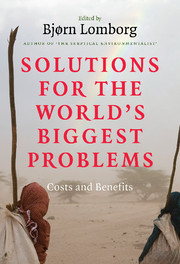Book contents
- Frontmatter
- Contents
- List of figures
- List of tables
- List of contributors
- Acknowledgements
- Introduction
- Part I Economy
- Part II Environment
- Part III Governance
- 11 Arms proliferation
- 12 Conflicts
- 13 Corruption
- 14 Lack of education
- 15 Terrorism
- Part IV Health and population
- Conclusion: Making your own prioritization
13 - Corruption
Published online by Cambridge University Press: 08 July 2009
- Frontmatter
- Contents
- List of figures
- List of tables
- List of contributors
- Acknowledgements
- Introduction
- Part I Economy
- Part II Environment
- Part III Governance
- 11 Arms proliferation
- 12 Conflicts
- 13 Corruption
- 14 Lack of education
- 15 Terrorism
- Part IV Health and population
- Conclusion: Making your own prioritization
Summary
Effective solutions to pressing global problems depend upon both good policies and effective institutions. No policy can succeed if a country's public and private institutions are corrupt and dysfunctional. True, some countries are able to function in spite of pervasive corruption, but corruption and poverty go together, and even viable corrupt countries would do much better with more effective institutions.
Varieties of corruption
Corruption occurs where private wealth and public power overlap. I differentiate between low-level opportunistic payoffs and systemic corruption, which implicates an entire bureaucratic hierarchy, electoral system, or governmental structure from top to bottom.
Low-level corruption occurs within a framework where basic laws and regulations are in place, and officials and private individuals seize upon opportunities to benefit personally. There are several generic situations.
First, a benefit may be scarce, and officials may have discretion to assign it to applicants. This would seem the least problematic case. The obvious policy response is to sell the benefit legally. However, even that may not work. Officials may pocket the proceeds or steal the goods outright. In Uganda, a study found that 68–77 percent of user charges paid for pharmaceuticals were pocketed by clinic workers, and 40–94 percent of drugs simply disappeared (McPake et al. 1999, 855–56). In Brazil, federal police authorities estimate that embezzlement in the pharmaceutical sector totals $637 million per year (Colitt 2004).
Second, low-level officials may be required to select only qualified applicants.
- Type
- Chapter
- Information
- Solutions for the World's Biggest ProblemsCosts and Benefits, pp. 229 - 240Publisher: Cambridge University PressPrint publication year: 2007



